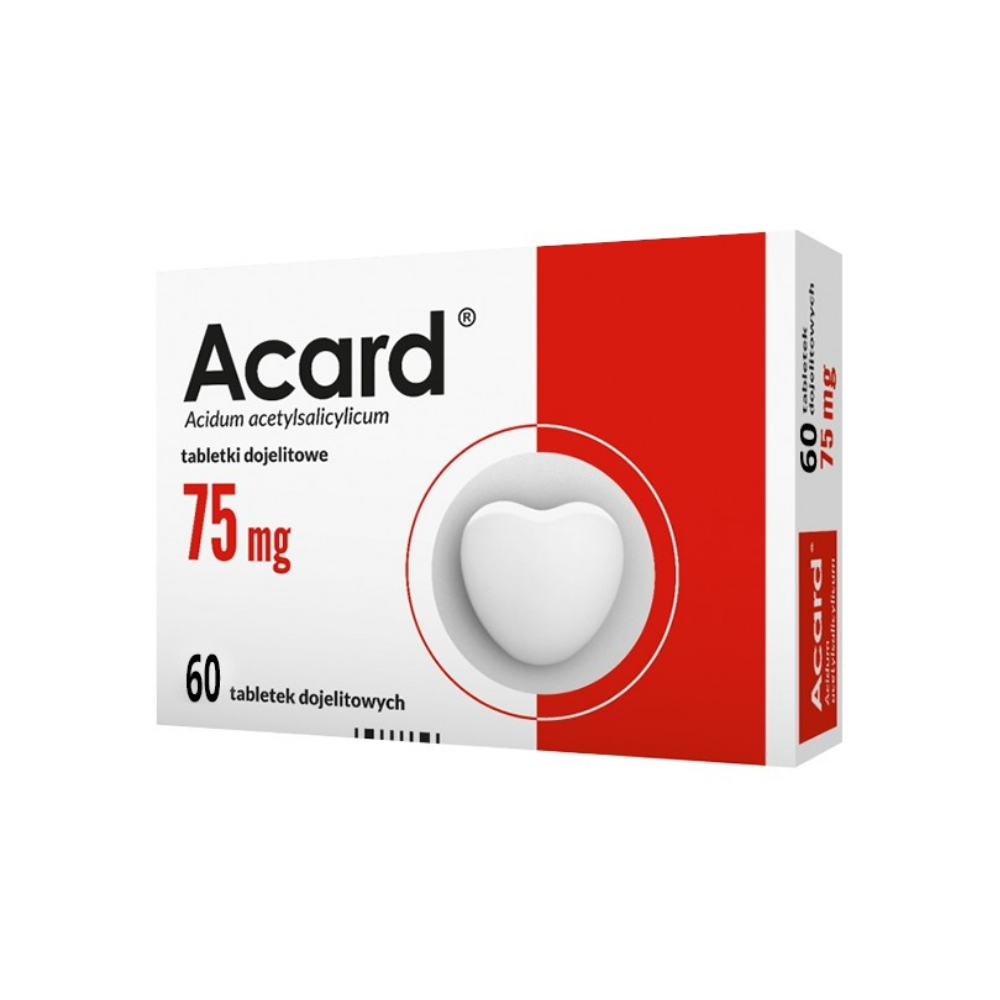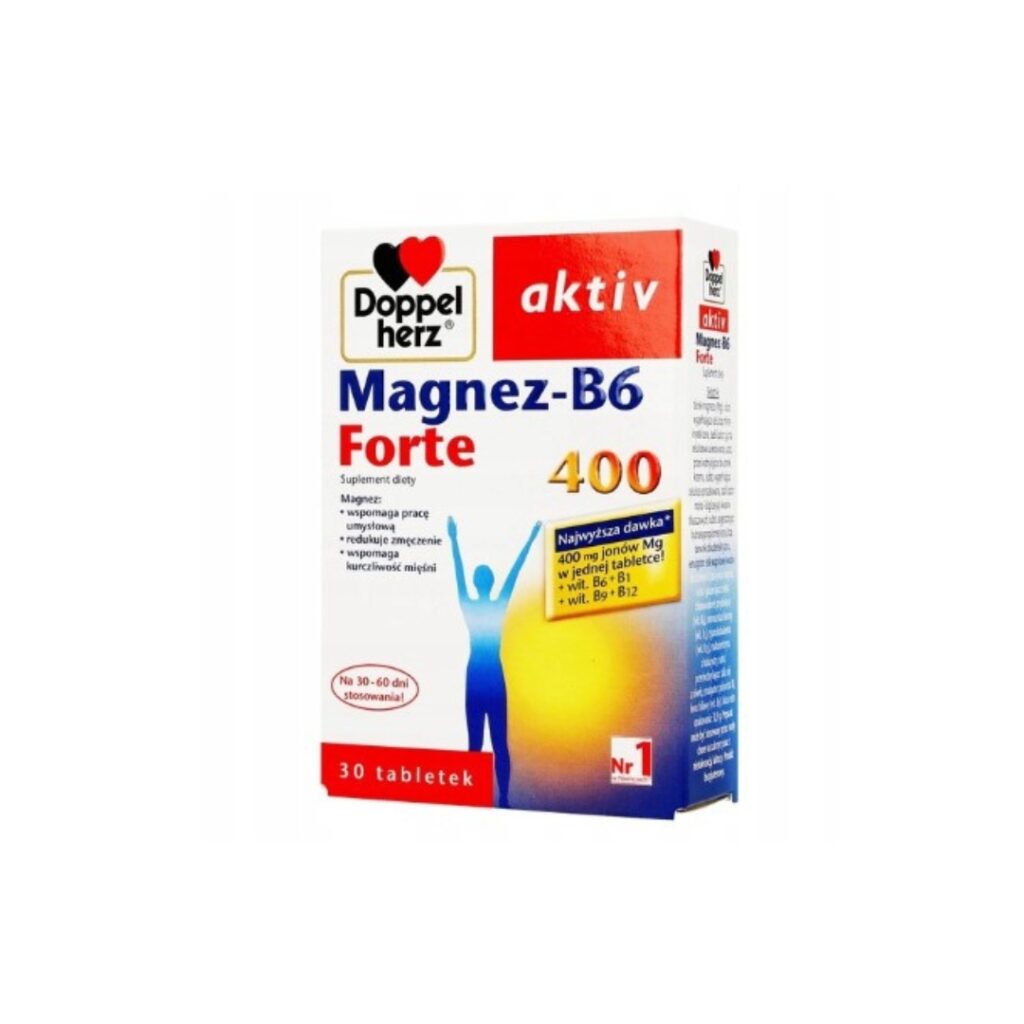Acard 75mg (60 Tablets)
Acard is an anticoagulant medicine that contains acetylsalicylic acid, an active substance that inhibits the clumping (aggregation) of platelets. Acard is intended for long-term, prophylactic use in diseases that may lead to the formation of blood clots and blockages in blood vessels (including prevention of a heart attack in high-risk people or prevention of ischemic stroke).
Platelet aggregation is the basic process responsible for the gradual narrowing of the coronary vessel in the course of ischemic heart disease. The deposition of platelet aggregates on the atherosclerotic vessel segment leads to the formation of blood clots, gradually worsening the perfusion of the heart muscle, up to its infarction.
Take Acard once a day after a meal. The capsule should be swallowed whole – Acard gastro-resistant tablets are coated and do not disintegrate in the stomach, which reduces the irritating effect of acetylsalicylic acid on the gastric mucosa.
Who is Acard intended for?
Acard is used:
- to prevent a heart attack in people at high risk;
- in a recent heart attack or suspected recent heart attack;
- in unstable coronary artery disease;
- to prevent a second heart attack;
- after vascular surgery or interventions, e.g. coronary bypass grafting, coronary artery plastic surgery;
- for the prevention and post-treatment of transient ischemic attacks of the brain and ischemic stroke;
- in people with obstructive atherosclerosis of peripheral arteries;
- to prevent coronary artery thrombosis in patients with multiple risk factors;
- for the prevention of venous thrombosis and pulmonary embolism in patients who are permanently immobilized.
Active substance: Acidum acetylsalicylicum
Composition
| 1 gastro-resistant tablet contains: | 75 mg of the active ingredient acetylsalicylic acid |
| the other ingredients are: powdered cellulose, corn starch, sodium carboxymethyl starch; shell: hypromellose, methacrylic acid copolymer type C, talc, titanium dioxide (E 171), colloidal anhydrous silica, sodium bicarbonate, sodium lauryl sulfate, triethyl citrate, anti-foaming emulsion. |
Dosage
Acard is available in two strengths: 75 mg and 150 mg. Your doctor will prescribe a dose that is right for you and determine the duration of use.
Use orally.
Usually the recommended dosage is:
- 1 tablet (75 mg) Acard daily. Enteric-resistant tablets should be taken after a meal – swallowed whole with a little water. ACARD gastro-resistant tablet is coated and does not disintegrate in the stomach, which reduces the irritating effect of acetylsalicylic acid on the gastric mucosa.
- In a recent myocardial infarction or suspected recent myocardial infarction: 4 gastro-resistant tablets (300 mg) at a time. The tablets should be chewed very carefully to speed up the absorption.
Note: in acute myocardial infarction or suspected acute myocardial infarction, gastro-resistant tablets may be used when acetylsalicylic acid is not available in uncoated tablets.
Contradictions
Acetylsalicylic acid in Acard should not be used:
- in case of hypersensitivity to acetylsalicylic acid, other salicylates or to any of the excipients;
- in patients with hemorrhagic diathesis;
- in patients with an active stomach ulcer and / or duodenal ulcer;
- in patients with severe renal insufficiency;
- in patients with severe hepatic insufficiency;
- in patients with so-called seizures a history of aspirin-induced asthma induced by the administration of salicylates or similar substances, particularly non-steroidal anti-inflammatory drugs;
- concomitantly with methotrexate in doses of 15 mg per week or more;
- in the last trimester of pregnancy;
- in children up to 12 years of age in the course of viral infections due to the risk of Reye’s syndrome – a rare but severe disease that causes damage to the liver and brain.
Contents
Acard tablets are white to off-white, heart-shaped, biconvex tablets with a smooth surface.
The package contains 60 gastro-resistant tablets and a leaflet.
Storage method
15°C-25°C
Manufacturer
POLFA WARSZAWA
Warnings
Talk to your doctor or pharmacist before using Acard tablets:
- if you are allergic to anti-inflammatory and anti-rheumatic drugs (e.g. naproxen) or other allergenic substances
- if you suffer from asthma, chronic respiratory diseases, nasal polyps;
- if you have a history of gastrointestinal ulcer;
- if you have hereditary deficiency of glucose-6-phosphate dehydrogenase (a rare hereditary disease);
- if you have severe heart failure;
- if you suffer from impaired kidney and / or liver function, as there is a risk of an increase in side effects of this medicine.
- Do not use Acard for at least 5 days before a planned surgery (also before minor procedures, e.g. tooth extraction).
Acard during pregnancy and breastfeeding
Acard can be used in the first 6 months of pregnancy only after consulting a doctor. The use of the drug in the last three months of pregnancy is contraindicated as it may cause complications for the mother and the child.
Short-term use of Acard by a breast-feeding woman does not pose a great risk to the breast-fed child. However, breastfeeding is not recommended during long-term use of high doses of acetylsalicylic acid.
Driving vehicles
Acard has no influence on the ability to drive and use machines.
Acard and the use of other drugs – interactions
Tell the doctor or pharmacist about all the drugs taken by the patient now or recently, as well as about the drugs that the patient is planning to take.
Do not use Acard at the same time:
- with methotrexate in doses of 15 mg per week or more;
- with ibuprofen.
You can use ACARD after consulting your doctor with the medicines listed below:
- with anticoagulants (e.g. acenocoumarol, warfarin, heparin);
- with other non-steroidal anti-inflammatory drugs, including salicylates;
- with drugs used in gout (e.g. probenecid, benzbromarone);
- with antidiabetic drugs
- oral (e.g., tolbutamide, glibenclamide) and insulin;
- with drugs that inhibit platelet aggregation (e.g. ticlopidine);
- with drugs used to treat depression and anxiety (e.g. fluoxetine, paroxetine);
- with diuretics (e.g. furosemide);
- with systemically acting glucocorticosteroids;
- with antihypertensive drugs (e.g. enalapril, captopril);
- with valproic acid (an anti-epileptic drug);
- with methotrexate in doses less than 15 mg per week;
- with digoxin (a heart medicine).
Alcohol may increase the risk of gastrointestinal adverse reactions caused by acetylsalicylic acid.
Acard and possible side effects
Like all medicines, this medicine can cause side effects, although not everybody gets them. Stop using the drug and contact your doctor immediately if you experience the first signs of hypersensitivity (e.g. swelling of the face, lips, tongue, throat, causing difficulty in breathing or swallowing) or develop bleeding, e.g. from the gastrointestinal tract (symptoms: black stools), or haemorrhages. The doctor will then assess the severity of symptoms and decide on further treatment.




